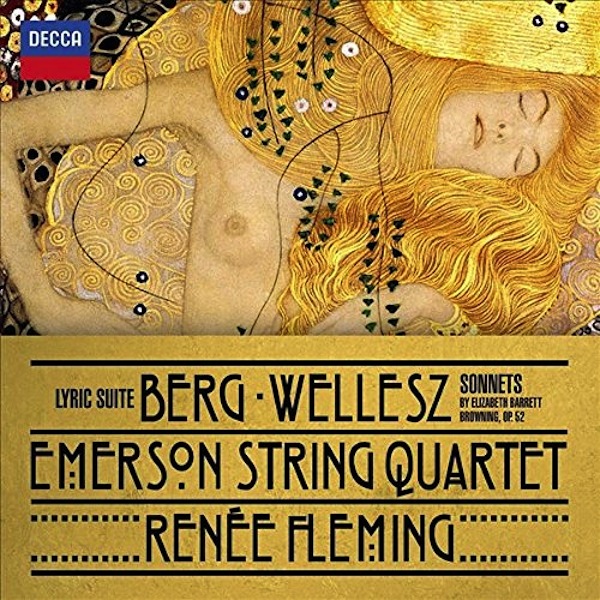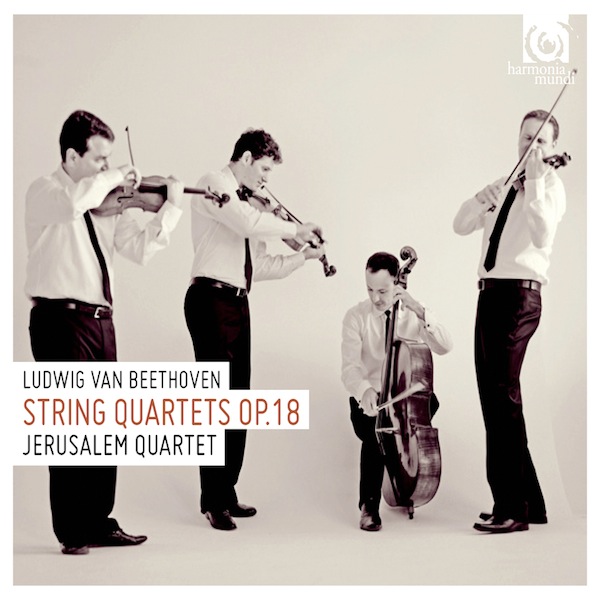Classical Music CD Reviews: Emerson String Quartet and Renée Fleming Do Justice to Viennese Modernists; Jerusalem Quartet Play Beethoven String Quartets
The Emerson String Quartet and Renée Fleming team up for one of the finest recordings of the year; the Jerusalem String Quartet gets their twentieth birthday celebrations off on a (mostly) positive footing.

By Jonathan Blumhofer
Here we have, perhaps, the finest recording I’ve heard this year. On the surface, at least, there’s not much easy about the Second Viennese School and not a few of the composers who orbited, near and far, around Arnold Schoenberg’s dodecaphonic sun. But within that circle, there were some widely differing musical points of view and every once in a while you encounter a performance so well conceived, so finely executed, and so deeply expressive of the many faces of Viennese Modernism that the simple joy — yes, joy! — of hearing it all makes you forget the politics behind the period and/or the rigorous complexity of the compositional process. Such is the case with Decca’s compelling new release of the Emerson String Quartet and Renée Fleming performing music by Alban Berg, Egon Wellesz, and Eric Zeisl.
There’s a certain poignancy to this collection of music, written between 1926 and 1938. The Third Reich banned all of it and the careers of both Wellesz and Zeisl were radically redirected by the encroaching threat of the Nazi regime (Berg escaped this particular fate, dying pre-Anschluss on Christmas Eve, 1935). You don’t necessarily need to know this to appreciate the music, but it does help at least partially explain the lamenting character of the Wellesz and Zeisl scores, and the fact helps brings to life — in a special, immediate way — a time and place quickly receding into memory.
Berg’s Lyric Suite is the only non-tonal score on the album, though that fact hardly registers, so sweeping and truly Romantic — big-boned, expressive, and filled with color — is the Emerson’s playing. The Suite is among the most intense and passionate pieces that Berg (or any composer, for that matter) wrote during the long 20th century, filled with musical and numerological symbols that reference his clandestine relationship with Hanna Fuchs-Robettin, a married woman with whom Berg (also married) had fallen in love in 1925. It hides its autobiographical qualities well – they weren’t widely known until the late 1970s, after all, thanks to the research of the composer George Perle — though there are a few very audible hints (notably quotes from Zemlinsky’s Lyric Symphony and the Prelude to Tristan und Isolde).
In this recording, the Emerson’s reading of the Suite’s first movement is rich and robust; the third, with its chilling, breakneck sul ponticello writing, downright wild; the fourth, intense and appropriately passionate. The finale is presented here in two versions, the first being the familiar instrumental setting Berg originally published in 1927. The second version was only discovered in 1977 and includes a setting of Stefan George’s German translation of a text by Baudelaire, sung here by Fleming. Both are grandly played, but the latter is pure magic, a warm, captivating blend of voice and strings.
Those same qualities mark Fleming’s and the Emerson’s performances of Wellesz’s Sonnets by Elizabeth Barrett Browning and Zeisl’s short, haunting Komm, süsser Tod. The latter all but stops time with its glowing harmonic progressions that cross Schubert and Wolf and straightforward melody. Zeisl was an Austrian Jew who left Vienna for Paris just before Kristallnacht in 1938 and eventually settled in Los Angeles. Though he lived until 1959, he wrote no lieder after his emigration, and Komm, süsser Tod was among his final batch of songs. Appropriately, it is filled with bittersweet nostalgia. Fleming sings it with focused tone and a heartbreaking restraint — this is music that makes its point directly and powerfully, suggesting a fine composer well worth wider discovery.
The same can be said of Wellesz, whose Sonnets set five of Browning’s “Sonnets from the Portuguese” (in Rainer Maria Rilke’s German translation). Written in 1934, the Sonnets are striking for their balance of Modernist aesthetics with clearly Romantic sensibilities — the shadows of Berg, Mahler, Schoenberg, and Wolf are never far away, though Wellesz’s personal voice is confidently present.
The textures and structures of each Sonnet are varied smartly. The first, “Un es geschein mir einst,” opens with a long, noble instrumental introduction before ceding to the voice. “Nur drei jedoch,” the second sonnet, begins with layers of voices — first the solo singer with cello, then the rest of the quartet gradually enters — before building to a big climax that resolves to a sweet, beautiful coda. The third is the most intense of the set, almost operatic in quality, while the fourth weaves a series of canonic figures. In the finale, “Mir scheint, das Angesicht der Welt verging,” pulsing, martial rhythms alternate with disjunct solo episodes; eventually, though, all resolves peacefully.
Fleming and the Emersons own these songs: their reading of the Sonnets radiates warmth, beauty of tone, and strength of character. It’s hard to imagine a singer better suited to this repertoire than she, with her creamy tone, excellent diction, and deep reservoir of expression. The Emersons have, for some time now, been arguably the finest quartet on the scene and they play like it here, balancing technical skill and emotional intelligence in equal measure.
You can hardly ask for more from an album like this one, either by way of the quality of the music presented or the fact that these seasoned artists are seeking out and championing works that have been unjustly neglected by posterity.
*****

What is one to make of the Jerusalem String Quartet’s (JSQ) new recording of Beethoven’s first six string quartets, op. 18, on Harmonia mundi (HM)? The album marks the ensemble’s twentieth anniversary this coming season and it certainly demonstrates some fine characteristics borne of two decades of playing together. The group’s articulations and phrasings are uniform and perfectly judged: no part stands out that shouldn’t. Ensemble playing is incredibly tight and confident — there’s a strong sense that the four members of the Quartet (violinists Alexander Pavlovsky and Sergei Bresler, violist Ori Kam, and cellist Kyril Zlotnikov) can read each other’s minds, which, at this point, maybe they really can.
But there are some quirks to the performances that left me equivocal on this cycle as a whole. At the core is the almost too-genteel approach the Quartet takes to several of these pieces: the finale of the F major Quartet (no. 1), for instance, feels reined in and never attains the full measure of abandon that is its due. In the D major Quartet (no. 3), the development in the opening movement would really benefit from more aggressive playing, generally. The overall impression of all six, if you listen to them in succession, is that this set doesn’t offer enough by way of contrast between the individual quartets. There’s also an odd editing error in the last movement of the A major Quartet (no. 5), which adds an extra beat to one of the measures in the recapitulation. The last doesn’t make or break the set, but it is a surprising blemish considering the usually consistently high quality of HM’s product.
That said, individually, there are some fine characteristics on display in this collection. The A major Quartet (no. 5), even with the added beat, possesses a lovely, Mozartian sparkle throughout. The JSQ’s reading of the G major (no. 2) is downright brilliant, bright-toned, energetic, and articulate in the outer movements, noble and jovial in the second, and really refined in the third. And the B-flat major (no. 6) showcases explosive playing in the first and third movements, and a fine sense of pacing and drama in the finale with its famous “La Malinconia” interjections.
Among the others, the great slow movement of the F major (no. 1) receives a noble performance with some shattering climaxes and the last two movements of the D major (no. 3) feature, respectively, sprightly accounts of its offbeat spirit and a witty realization of the charming, frolicsome character of the finale. The C minor Quartet (no. 4) is turbulent enough, though even the JSQ can’t cover up the fact that it’s the least impressive entry, compositionally, of the six.
So the cumulative experience here is a bit mixed: this isn’t a landmark Beethoven set, but it does demonstrate some smart, athletic playing by the JSQ and gets their twentieth birthday celebrations off on a (mostly) positive footing. It will be interesting to hear how, if at all, their performances adjust during their upcoming tours (they come to Boston, courtesy of the Celebrity Series, in April with the Quartet no. 2 in tow).
Jonathan Blumhofer is a composer and violist who has been active in the greater Boston area since 2004. His music has received numerous awards and been performed by various ensembles, including the American Composers Orchestra, Kiev Philharmonic, Camerata Chicago, Xanthos Ensemble, and Juventas New Music Group. Since receiving his doctorate from Boston University in 2010, Jon has taught at Clark University, Worcester Polytechnic Institute, and online for the University of Phoenix, in addition to writing music criticism for the Worcester Telegram & Gazette.
Tagged: Alban Berg, Decca, Egon Wellesz, Eric Zeisl, Jerusalem String Quartet, Renée Fleming

[…] By Jonathan Blumhofer, ArtsFuse […]